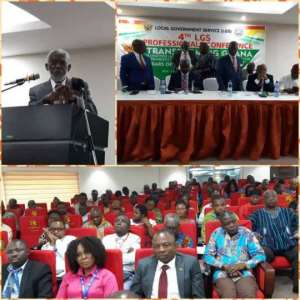
Professor Stephen Adei, Dean of Arts and Sciences, Ashesi University, has noted that a well-coordinated decentralized system can open up Ghana to become an economic power hub.
He said intervention policies such the One District One Factory, Planting for Food and Jobs, among others held the key in transforming the economic fortunes of the country only if decentralization was firmly rooted at the local level.
Prof. Adei who was speaking at the fourth Local Government Service Professional Conference in Ho on the theme: 'Transforming Ghana through Effective Leadership, Coordination and Implementation of Government's Policy at the Decentralized Level in the 30 years of Ghana's Decentralization' said Ghana's economic power could potentially attract both local and foreign investors.
He said "Ghana beyond aid" would be possible if Ghana reached a point where it had a much more coordinated resources from harnessing its local potentials to sustain it for about 50 years with a plan to utilize the resource and its developmental and infrastructural challenges.
Prof. Adei said though borrowing seemed to have come to stay with the country, the yolk must be broken to allow Ghana attain her financial sovereignty and bring her to a level where she would not be dependent on others but a partner to reckon with on the global economic stage.
Mr Yaw Osafo Marfo, Senior Minister, Office of the President, said effective implementation of government policies thrived best on game changing leadership who were able to resolve and harmonize efforts to maximize the returns of resources at their disposal.
He urged the professionals to be the 'game changers' in Ghana's transformational agenda and stand up against the negative status quo attached to public service delivery that had no positive change at all levels of decentralization.
Mr Osafo Marfo said over the years, the public had lost the trust and confidence in public officials because of their inability to live up to the principles of transparency, accountability and diligence in the application of resources in the various institutions.
He challenged them to expose wrong and fraudulent deals in their institutions as the seemingly acceptance and protection of 'bad nuts and bad practices' had enabled them to fester.
Hajia Alima Mahama, Minister for Local Government and Rural Development, whose speech was read on her behalf called for synchronization of resources and energy of members of the community to deliver on agreed priorities as the traditional source of resources continued to be restrained.
She called for a more innovative ways to improve revenue mobilization in the various Metropolitan, Municipal and District Assembly (MMDA).
Hajia Alima said revenue received from the central government and development partners was meant to augment their revenue mobilization efforts at the local level.
Dr Archibald Yao Letsa, Volta Regional Minister, said efficient and timely service delivery at the Regional and District levels required competent and dedicated professionals as key ingredients to prosecute planned programmes and projects of government towards a successful achievement of the decentralization process.
He said quality leadership and management were critical requirements for Professionals in the Local Government Service (LGS) to respond to the needs of the citizens and emerging challenges in the provision of quality services.
Dr Letsa said the successful achievement of the Service's Performance Management Systems would largely depend on competent officers and professionals supported with logistics and funds to be able to discharge their duties effectively and efficiently.
Dr Nana Ato Arthur, Head, LGS, said the sustainability of all government interventions could be realised if local authorities were made to manage, supervise and maintain their implementation.
He said the geographical reach of local government made the Service a strategic partner in ensuring sustainability of the innovations.
Dr Ato Arthur noted that the structures at the local level were usually underutilized by development partners with the excuse that they lacked capacity, professionalism and logistics among others.
He however, assured that the Service was poised to support all programmes towards the development of communities.
GNA
By Sumaiya Salifu Saeed, GNA




 We’ll no longer tolerate your empty, unwarranted attacks – TUC blasts Prof Adei
We’ll no longer tolerate your empty, unwarranted attacks – TUC blasts Prof Adei
 Bawumia donates GHc200,000 to support Madina fire victims
Bawumia donates GHc200,000 to support Madina fire victims
 IMF to disburse US$360million third tranche to Ghana without creditors MoU
IMF to disburse US$360million third tranche to Ghana without creditors MoU
 Truck owner share insights into train collision incident
Truck owner share insights into train collision incident
 Paramount chief of Bassare Traditional Area passes on
Paramount chief of Bassare Traditional Area passes on
 Two teachers in court over alleged illegal possession of BECE papers
Two teachers in court over alleged illegal possession of BECE papers
 Sunyani: Victim allegedly shot by traditional warriors appeals for justice
Sunyani: Victim allegedly shot by traditional warriors appeals for justice
 Mahama vows to scrap teacher licensure exams, review Free SHS policy
Mahama vows to scrap teacher licensure exams, review Free SHS policy
 Government will replace burnt Madina shops with a new three-story, 120-store fac...
Government will replace burnt Madina shops with a new three-story, 120-store fac...
